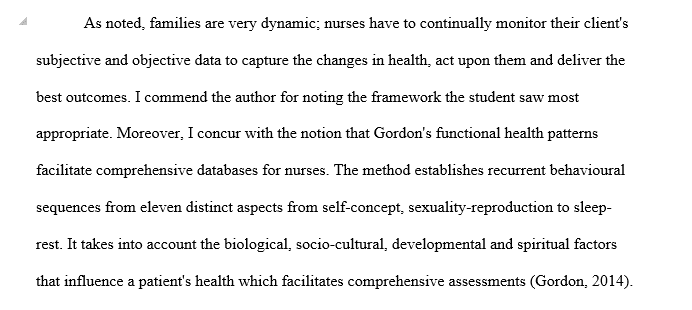Functional health patterns
Families are very different and constantly going through changes. Each family has their own unique structure and own ways of dealing with these changes. In order to understand a family and the risks associated to them, a nurse must use a framework assessment as a tool to collect data to better understand family structures and functions. For this reason, this student feels that Gordon’s Functional Health Patterns is a more useful guide to the nursing process in regard to assessment of the family. This particular theoretical perspective encompasses eleven functional health patterns enabling the nurse to comprehensively organize family information. These patterns include health perception-health management, nutritional-metabolic, elimination, activity-exercise, sleep-rest, cognitive-perceptual, self-perception/self-concept, roles-relationships, sexuality-reproductive, coping-stress, values beliefs. Patterns form the standardized format for family assessment using a systems approach with emphasis on developmental stages and risk factors (Edelman, Kudzma & Mandle, 2014). Assessment includes evaluation of dysfunctional patterns within families with corresponding details in one or more of the other interdependent patterns (Edelman et al, 2014). Gordon’s Functional Health patterns approach is the theory most appealing to this student because it serves as a more organized way to obtain relevant data. An organized approach is always best practice when performing assessments on families and an individual.
Reference
Edelman, C., Kudzma, E., Mandle, C. (2014). Health Promotion Throughout The Lifespan, 8thEdition. [Pageburstl]. Retrieved from https://pageburstls.elsev
Solution preview for the order on Functional health patterns
APA
186 words
